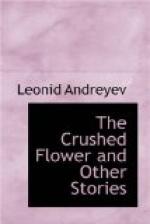THE CRUSHED FLOWER
CHAPTER I
His name was Yura.
He was six years old, and the world was to him enormous, alive and bewitchingly mysterious. He knew the sky quite well. He knew its deep azure by day, and the white-breasted, half silvery, half golden clouds slowly floating by. He often watched them as he lay on his back upon the grass or upon the roof. But he did not know the stars so well, for he went to bed early. He knew well and remembered only one star—the green, bright and very attentive star that rises in the pale sky just before you go to bed, and that seemed to be the only star so large in the whole sky.
But best of all, he knew the earth in the yard, in the street and in the garden, with all its inexhaustible wealth of stones, of velvety grass, of hot sand and of that wonderfully varied, mysterious and delightful dust which grown people did not notice at all from the height of their enormous size. And in falling asleep, as the last bright image of the passing day, he took along to his dreams a bit of hot, rubbed off stone bathed in sunshine or a thick layer of tenderly tickling, burning dust.
When he went with his mother to the centre of the city along the large streets, he remembered best of all, upon his return, the wide, flat stones upon which his steps and his feet seemed terribly small, like two little boats. And even the multitude of revolving wheels and horses’ heads did not impress themselves so clearly upon his memory as this new and unusually interesting appearance of the ground.
Everything was enormous to him—the fences, the dogs and the people— but that did not at all surprise or frighten him; that only made everything particularly interesting; that transformed life into an uninterrupted miracle. According to his measures, various objects seemed to him as follows:
His father—ten yards tall.
His mother—three yards.
The neighbour’s angry dog—thirty yards.
Their own dog—ten yards, like papa.
Their house of one story was very, very tall—a mile.
The distance between one side of the street and the other—two miles.
Their garden and the trees in their garden seemed immense, infinitely tall.
The city—a million—just how much he did not know.
And everything else appeared to him in the same way. He knew many people, large and small, but he knew and appreciated better the little ones with whom he could speak of everything. The grown people behaved so foolishly and asked such absurd, dull questions about things that everybody knew, that it was necessary for him also to make believe that he was foolish. He had to lisp and give nonsensical answers; and, of course, he felt like running away from them as soon as possible. But there were over him and around him and within him two entirely extraordinary persons, at once big and small, wise and foolish, at once his own and strangers—his father and mother.




